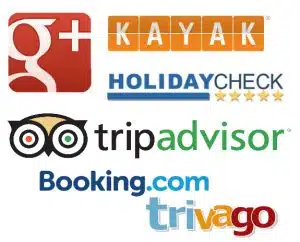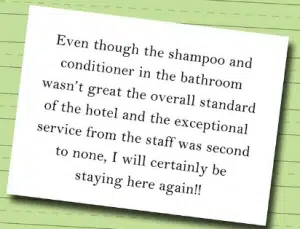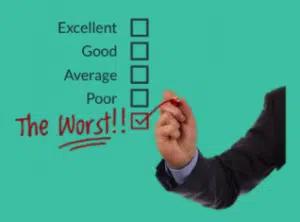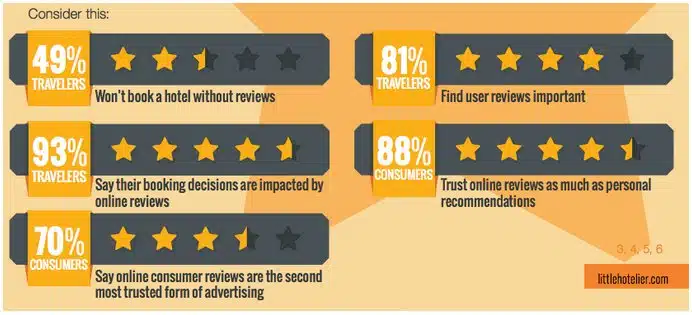In the digital age, your hotel’s online reputation is everything. Combined, social media channels, travel review websites and OTAs feature millions of customer reviews that have the power to heavily influence the decisions of your guests.

As such, hotels need to do everything possible to build a strong online reputation. The following post outlines just some of the key ways this can be achieved.
The Importance of Responding to Reviews
Responding to reviews shows you’re highly engaged with your guests and care about their experience. And it can also have a direct impact on booking decisions. In late 2013, a study by TripAdvisor and PhoCusWright discovered that 62% of travellers were more likely to book if they saw that hotel management responded to feedback.

Speed of response was also found to be a key factor: properties that replied to feedback in less than a day increased occupancy rates by 12.8% compared to properties that took two days.
Of course, most hotels simply haven’t the time to respond to all feedback. But it’s important to at least personalize the replies you do send.
For instance, thank a guest by name, acknowledge how grateful you are for their review, and address any specific comments they leave. As well as demonstrating that you’ve taken the time to show your appreciation, it’ll hint at the personal level of attention your hotel offers – a great advert to others reading your reply.

The ability to handle a negative review is especially crucial to a hotel’s reputation. It’s an opportunity to show you value feedback, and that you’re prepared to take active steps to resolve a problem.
To protect your brand reputation (and give a positive impression to potential guests), you should respond to 100% of the negative reviews you receive – ideally after no longer than 48 hours.
It’s also essential not to appear defensive. Thank the guest for their stay and express regret about their experience. Apologise for any inconvenience caused and offer a solution or describe the steps your hotel is taking as a result of their comments. Being seen as sincere, professional and willing to take action will all stand you in good stead.
Being Proactive with Reputation Management
While responding to reviews is vital, a great online reputation also involves actively encouraging them in the first place. The more reviews you have, the greater confidence you’ll build among potential new guests. In addition, a higher number of ratings will increase your search engine and review site ranking positions.
First, try to get feedback from guests while they’re still at the hotel – they’ll be more likely to do this then, than after they’ve checked out. Use a guest messaging solution that asks the guest for feedback during their stay. Getting feedback during the stay would allow you to address any issue a guest may bring up and resolve them whilst they are still in your hotel. This is an opportunity to put things right.
During the check-out process, enquire about the guest’s stay and check they were happy with the service you provided. If they’ve had a positive time with you, ask them to post an online review or have a sign on the front desk encouraging guests to share any great experiences they’ve had with you on your chains review site or TripAdvisor etc.
Post-stay emails provide another opportunity to seek reviews once a guest has checked out. To heighten the chances of a response, send the email within 2-3 days when their experience is still fresh in the mind.

Finally, ask if they can share a review on TripAdvisor or social media and include relevant links to make doing this as simple as possible.
The Additional Benefits of Reviews
Beyond those mentioned, there are a number of less obvious benefits to gaining reviews that are worthy of mention:
Reviews Boost Direct Bookings
The vast majority of people visiting your website will want to see some form of social proof before they book. If your website doesn’t feature any guest reviews or testimonials, the chances are most people will head to TripAdvisor or an OTA to see what other travellers are saying about your property.
When they happens, you risk losing the booking.
A potential customer will suddenly be exposed to your competitors. Or they might end up booking your hotel with an OTA instead. To boost the chance of a direct booking, make sure you feature reviews throughout your website – from the homepage right the way through to the checkout.
Reviews Boost SEO
Google’s algorithm is designed to serve up the most helpful options for its users, and having a lot of reviews is a key ranking factor. In particular, having a large number of reviews is especially helpful to achieve a prominent position during local search results.

Reviews Help with Marketing
It’s clear that the content of reviews can be hugely helpful to improve service levels and guest satisfaction. But the language people use to describe your hotel also has unique benefits.
For instance, using specific phrases or benefits that frequently get mentioned in reviews about your hotel can help you write more effective copy for your website and marketing. You might notice recurring phrases such as “gorgeous hotel in the country”, or “dream destination for families.”
These nuggets can provide the inspiration (or even be used verbatim) within your copy. Compared to a slick marketing message, using the language of your guests will instantly feel more natural. And it’ll help you focus your messaging on the features that people find most attractive about your property.
Building a Great Reputation: Offline
While online reputation management gets discussed a lot, managing your reputation offline also warrants significant attention. The key to this involves super-serving guests long before they arrive.
For instance, handling a reservation query over the phone in the right way can set the whole tone for the hotel stay. Providing helpful advice, asking questions, and offering personalised suggestions on room types, trips or the wider location will set the foundations for a great guest experience and instantly enhance your reputation.
The check-in process also provides an opportunity to enquire about special requirements and offer additional assistance such as advice on the local neighbourhood, hotel amenities, or activities happening during the stay.
The last impression you make is also crucial. At checkout, showing a genuine interest in a guest’s experience will leave them with a positive final memory. It’s also a vital point to try and correct any service failures that might have been made, potentially influencing their final TripAdvisor feedback.
Conclusion
The value of your hotel’s reputation can’t be overstated. In the digital age, the vast majority of your guests are checking multiple reviews before they even book with you. Making sure your hotel is promoted in the best possible light has become more important than ever.
While time-consuming, consider each and every interaction as an opportunity to enhance your reputation – from handling the initial booking to actively seeking feedback from each guest. Given that your online reputation has a direct impact on everything from direct bookings to occupancy rates, it’s unquestionably time well spent.






